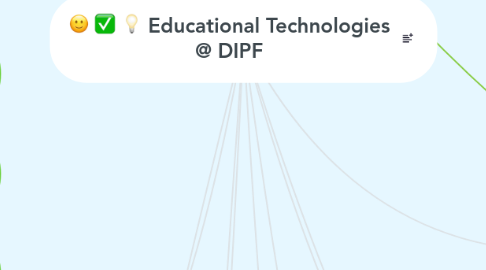
1. Oveararching Vision/ meaning of Education
1.1. Rational thinking
1.2. Equal opportunities
1.3. Skills development
1.4. Simulated enviroment
2. Research Topics
2.1. (Jan)
2.2. Open LAIR (Atezaz)
2.2.1. Tool to support LD with LA
2.2.2. Support of LA indicators
2.2.3. Dashboard, Repository of indicators
2.2.4. Interviews, Survey, EyeTracking(?)
2.3. DivCol (Dana)
2.3.1. Diversity of the team
2.3.2. Quality of the content
2.3.3. Regression analaysis
2.3.4. Topic: CSCL
2.4. StudiBot (Sebastian)
2.4.1. ChatBots for education
2.4.2. focus individual learner
2.4.3. RQs about guidelines, interface, knowledge, impact
2.5. EduTex (George)
2.5.1. Big Data Software Infrastructure
2.5.2. Researching Learning Context
2.5.3. Mobile Sensing
2.5.3.1. Human Activity Recognition for On Task Detection
2.5.3.2. Physical Learning Environment Detection
2.6. SECS (Daniel)
2.6.1. Self Regulating learning strategies
2.6.1.1. Self-Control
2.6.1.2. digital distraction
2.6.2. Sequence mining
2.6.3. DiFa project
2.6.4. PROMPT project
2.6.5. SERENE app
2.6.5.1. implementation intention
2.6.6. Social Control during Learning
2.6.6.1. social / shared control
2.7. VirtualConferences (Nina)
2.7.1. Perceived Values / Impact Factor
2.7.2. Study at LAK'21
2.7.3. CSCL presentation
2.7.4. Currently using surveys
2.7.5. Conference Design
2.8. (Daniele)
3. Tooling
3.1. Moodle Plugins
3.1.1. DIFA javascript listener
3.1.2. Concept Map
3.1.3. Rating tool
3.2. EMR Tool for SmartWatches
3.3. DIFA logging tool
3.4. SERENE / PROMPT Tool
3.5. Kafka infrastrucutre
3.6. ChatBot
3.7. OnTASK LA tool
4. Meetings
4.1. JourFix
4.2. PhD Meetings
4.3. Zoom workshop session
4.4. Project meetings
5. LiteratureReview
6. EduTec Network
6.1. StudiumDigitale
6.1.1. Valorization of EduTec tools
6.1.2. Digital Competence Model
6.1.3. Media didactic
6.1.4. eLearning Vernetzug
6.1.5. Funds for ideas
6.1.6. Teaching Tools
6.1.7. Video production / E-learning support
6.1.8. LEARNBAR moodle activity
6.1.9. Custom moodle plugins
6.2. TBA
6.2.1. Item builder for complex tasks
6.2.2. good developers
6.2.3. large skills assessment
6.2.4. DIFA
6.3. EduCS
6.4. Maturity funnel
7. Events/conferences
8. Teaching / learning content
8.1. Moodle
8.2. DELTA School
8.3. ITCILO Courses
8.3.1. Learning Analytics
8.3.2. Open Education
8.3.3. Mobile Learning
8.4. Learning Content that could be used for experiments & DELTA School
9. Research Methodology Toolbox
9.1. Surveys
9.1.1. MSLQ
9.1.2. SUS Scale
9.1.3. SRL survey
